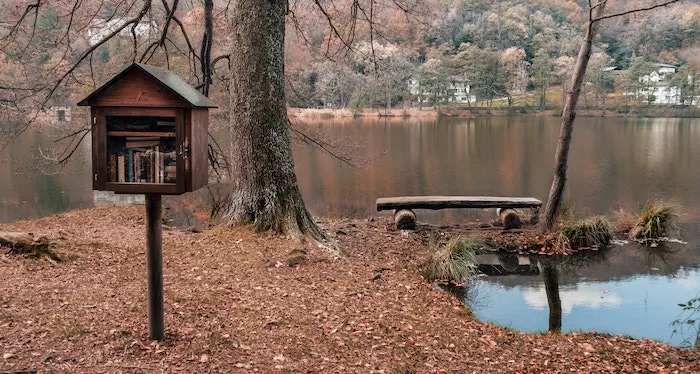
Diversifying Little Free Libraries: Learn, Support, and Get Inspired
What do you remember about the last time you visited a Little Free Library? Where was the neighborhood and what was it like? Who were the people in it? And what kinds of books did you find? According to this study, you were likely in a middle- or high-income neighborhood in close proximity to a library whose residents are well-educated and overwhelmingly white. You also may have noticed very few — if any — of the books were by and about BIPOC and other marginalized groups.
But if your last encounter with a Little Free Library (LFL) was not in a neighborhood like the ones described above, and if it was well-stocked with diverse literature, then you may have happened upon a LFL supported by one of a handful of organizations working to diversify both the locations and collections of the charming little boxes that book lovers — including many of us at Book Riot — love so much.
How is diversifying Little Free Libraries making a difference? It provides easy access to books in underserved communities, lets more people experience the joy of recognizing themselves in literature, and gives all of us a chance to consider life experiences from multiple perspectives. Many groups, individuals, and even the Little Free Libraries organization itself, are working to make the diversifying happen — whether it’s within their own communities or all across the country.
If diversifying Little Free Libraries is something you want to be part of, take a moment to learn about, support, and be inspired by just a few of the initiatives dedicated to this work.
Diversifying Little Free Libraries: The Locations
These initiatives are designed to bring more LFLs to communities that are underserved and/or not close to public libraries.
Little Free Library Impact Program
The Impact Library Program provides no-cost Little Free Libraries to “communities where books are scarce.” Any person or organization who feels their neighborhood would benefit from this program can apply for a granted library as long as they are able to commit to stewardship of the LFL once it’s installed. More than 1,350 libraries have been provided through this initiative.
How to help: Donate and/or apply for a LFL.
Detroit Little Libraries
This organization works with community partners to install LFLs “in front of individual homes, nonprofit organizations, faith-based institutions, small businesses, community gardens and farms, health care clinics, police stations and city parks.” Not only do they hope to promote reading, bring book access into more communities, and foster a pay-it-forward mentality, but they also hope the LFLs will serve as a gathering place for neighbors.
How to help: Donate and/or become a builder, partner, or steward.
Salina Public Library Little Free Libraries
The Salina Public Library in Kansas has worked with members of their community to set up more than ten LFLs across their city, allowing “greater access to books and reading and… resources for those that are homebound, have difficulty accessing transportation, those who face financial difficulties, children unable to access the library or bookstores, etc.”
How to help: If you live in the Salina area, you can donate books and/or adopt a library.
Diversifying Little Free Libraries: The Books
These initiatives are dedicated to diversifying LFLs by offering books by and about BIPOC, LGBTQ+, and other marginalized groups.
Little Free Diverse Libraries (Diverstories)
Little Free Diverse Libraries is a nonprofit organization, led by founder Sarah Kamya, committed to distributing donated diverse literature to LFLs around the world. Distributors and owners dedicate time to keeping inclusive books in their own libraries and in the LFLs in their area. Kamya, who also curates reading lists, plans to eventually expand her services even beyond LFLs.
How to help: Donate and/or become a distributor and/or owner.
Little Free Libraries Read in Color
In the fall of 2020, Little Free Libraries launched their Read in Color campaign, dedicated to stocking LFLs with books that celebrate diverse stories and authors. The initiative’s key components include encouraging everyone to sign a pledge to read and share diverse books, installing free diverse LFL structures in select communities, providing free diverse books from BIPOC-owned bookstores to LFL stewards, and sharing recommended reading lists.
How to help: Sign the pledge and/or donate.
Amplify Library
Amplify Library is “an NYC-based project centering and celebrating books by Black authors and those that contribute to anti-racist conversations.” Amplify Library partners with a local organization to build, install, and stock each striking yellow library with materials and books from BIPOC-led businesses. They make an effort to place libraries in neighborhoods that historically haven’t been home to inclusive bookstores and also to choose books about a range of topics — not just racial justice — by BIPOC authors from a variety of backgrounds.
How to help: Donate books that fit their guidelines and/or donate money to their partners.
Little Diverse Library
Inspired by Sarah Kamya’s Little Free Diverse Libraries, Little Diverse Library was created by two sisters in Madison, New Jersey. It began as a Girl Scout project, but after they held a book-donation drive at a local school and reached out to publishers for contributions, they ended up with a collection of more than 200 books by and about BIPOC. With so many books to share, the girls continue to stock and steward their library.
How to help: Donate books via their Amazon Wishlist.
Next time you visit a Little Free Library, take notice of where you are and what kinds of books are available inside. If it could use some diversity, ask yourself how you can help through one of these groups, with your own donations, or maybe even through an initiative you start yourself. Happy diversifying!







